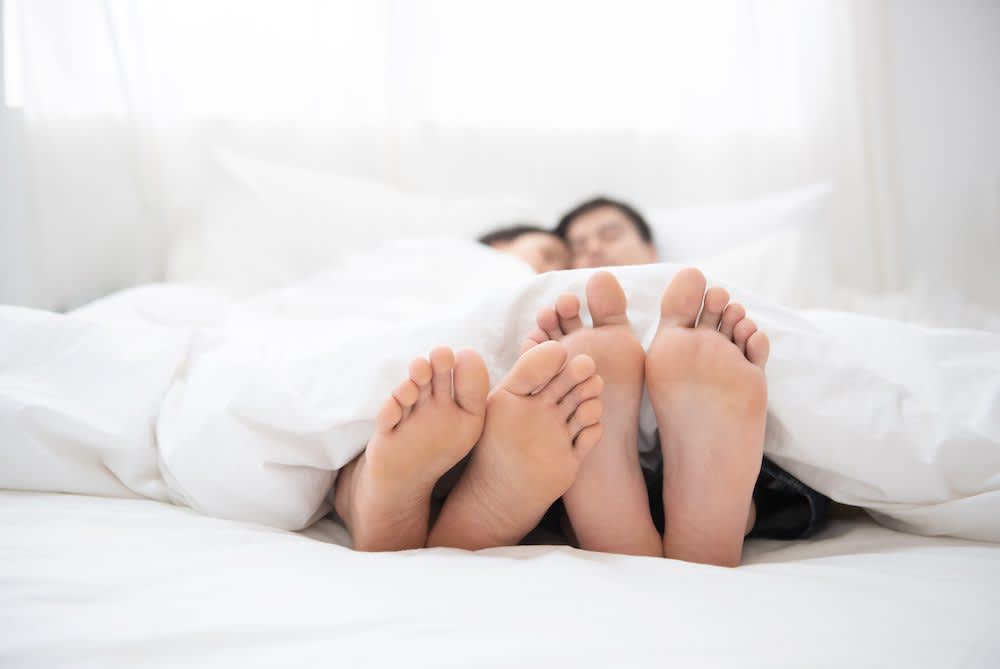People have a variety of different reasons for trying to lose weight. And while many of us tend to focus on food choices and exercise, sleep is also a vital part of the body weight equation.
Sleep impacts everything from metabolism to appetite. It can either help or hinder weight loss efforts, depending on if you’re getting your recommended hours of sleep or not. So if you’re struggling with maintaining or losing weight, it’s probably worth it to take a look at your sleep habits.
A wide variety of factors influence body weight, including family history, socioeconomic factors, age, sex, race and ethnicity, diet, and physical activity. If you’re trying to lose weight, or considering it, it’s important to talk with your doctor for support and guidance.
How Are Sleep and Weight Connected?
There’s a reciprocal relationship between sleep and weight, meaning good quality sleep supports weight loss, and short, poor quality sleep can contribute to weight gain.
The connection also works in both directions. Not getting enough sleep increases the risk of obesity, and having obesity puts people at higher risk for sleep disorders like obstructive sleep apnea (OSA).
The interplay between sleep and weight is complex, and researchers are still seeking to better understand this relationship. What we do know is that sleep influences a variety of processes in the body that also affect weight, including metabolism, appetite, and insulin.
Weight gain can also make it more difficult to get the sleep you need. Excess weight is a risk factor for several health conditions, like OSA, acid reflux, and arthritis, all of which tend to interfere with sleep.
How Does Sleep Influence Diet?
Food choice plays a central role in weight loss, and sleep influences everything from your appetite cues to the foods you crave to how much you eat. Sleep and diet are more interconnected than many people realize and interact on several levels.
- Appetite hormones: Two main hormones help regulate your appetite. Ghrelin, the “hunger hormone,” signals to the body to eat more, and leptin tells the body it’s satisfied and doesn’t need more food. When you lose sleep, ghrelin levels rise, and leptin levels fall, making you hungrier than usual and more likely to overeat.
- Food choices: Lack of sleep can also increase your likelihood to snack and reach for unhealthy foods. That’s because sleep influences reward pathways in the brain, leading you to eat for pleasure rather than eat because you’re actually hungry. What’s more, if you’re well-rested, you’re better able to say no to unhealthy foods.
- Meal timing: Sticking to a consistent sleep schedule is good for overall health and also helps with healthy meal timing. If you skip out on sleep and stay up late, you’re more likely to snack at night, which can interfere with weight loss goals. That’s because your body’s circadian rhythm primes the body to metabolize food better early in the day.
Food choices may also impact your ability to sleep. Having a large, heavy meal close to bedtime can make it difficult to get restful sleep, especially if you’re prone to acid reflux. There’s also research to show that some foods may help you sleep, like certain fruits and vegetables, whole grains, and seafood.
How Are Sleep and Exercise Related?
Being well rested helps you feel more motivated to exercise, and physical activity also contributes to better sleep.
In general, poor sleep is associated with lower rates of physical activity. When you’re tired, you are less likely to be active. Or a bad night of sleep might mean you skip your morning workout in order to sleep in.
Whatever the scenario, research shows that sleep issues can impact physical activity in both the short and long term. Poor sleep can not only affect your level of physical activity the next day, it also plays into how active you are for years down the road.
The flip side is that engaging in regular exercise can help improve sleep. If incorporating more exercise is a part of your weight loss journey, you can feel even more motivated knowing that it may help you sleep better. Engaging in vigorous exercise too close to bedtime, though, can interfere with sleep, so stick to workouts earlier in the day.
Exercise can also improve sleep-disordered breathing, including sleep apnea. One study showed a 25% decline in the severity of OSA after 12 weeks of exercise, even though weight loss was minimal.
In addition to helping you sleep, exercise can also improve mental health, help you build stronger muscles and bones, and reduce the risks of heart disease and certain cancers.
Sleep Apnea and Obesity
Obesity is common among people with obstructive sleep apnea, and up to 70% of people with OSA also have obesity.
OSA occurs when tissues in the upper airway narrow and block the flow of air. People with obesity tend to have excess tissue in their necks that obstruct the upper airway.
People with OSA experience multiple episodes of airway obstruction throughout the night. When the airway is blocked, someone with OSA works harder to get air in, leading to multiple sleep disruptions throughout the night, sleep deprivation, and low blood oxygen levels, and it activates the body’s stress response.
Common symptoms of OSA include snoring, waking up gasping for air, daytime sleepiness, headaches, difficulty focusing, low libido, and dry mouth. Untreated sleep apnea can increase the likelihood of developing more severe health conditions, like high blood pressure, stroke, and heart disease.
Treatments for OSA include using a continuous positive airway pressure (CPAP) machine while you sleep, using oral devices, and making changes to your lifestyle. Weight loss can also improve the symptoms of OSA.
The Link Between Sleep and Metabolism
Sleep and metabolism interact on a variety of levels, including the processing of glucose, fat storage, and overall metabolic regulation. Metabolism involves processes in the body that provide energy. In simple terms, it is the number of calories the body must burn to function.
Interestingly, sleep does not increase metabolism, like exercise does. In fact, metabolism actually slows by about 15% during sleep to allow for the body to repair itself. Sleep plays a role in weight loss in that proper sleep helps to maintain optimal metabolism.
Loss of sleep can alter metabolism in several ways.
- Glucose metabolism: An important part of metabolism is the process by which the body uses insulin to change glucose, the main type of sugar in your blood, into energy. When you’re sleep deprived, your body essentially becomes less sensitive to insulin, which can lead to excess glucose in the blood.
- Fat storage: There’s some evidence that lack of sleep can affect how fat is processed. When you’re low on sleep, your body tends to store fat rather than burning it, which can interfere with your weight loss goals.
- Metabolic regulation: In addition to these specific mechanisms, lack of sleep appears to disrupt metabolism in general by impacting hormones, inflammation, and the sympathetic nervous system, which regulates the fight-or-flight response.

Tips for Sleeping Better During Weight Changes
Making changes to your routine can help you sleep better.
- Stick to a routine: Try to have a regular bed and wake time every day.
- Limit caffeine, alcohol, and nicotine: Don’t consume caffeine too late in the afternoon or evening. Avoid nicotine, and try not to have alcohol too close to bedtime.
- Exercise: Exercise regularly, but avoid exercising too close to bedtime.
- Take care with naps: If you nap, do it before 2 p.m.
- Get some sun: Exposing yourself to sunlight in the morning can wake you up and make you feel sleepy in the evening.
- Avoid eating too late: Eat larger meals early in the day, and avoid eating and drinking too much in the evening.
- Relax: Develop a relaxation routine before bed, like taking a bath or reading a book.
- Set your bedroom up for success: Keep your bedroom cool and dark for the optimal sleep environment.
- Get rid of distractions: Keep light and sounds out of the bedroom, including T.V., computers, and phones.
If you still have trouble sleeping, talk to your doctor.
Healthy Mind, Healthy Body
Each body is unique, and it’s important to note that diet and exercise provide different results for different people. Lifestyle choices are only one piece of the puzzle, and some people have more barriers to making changes than others. Still, certain habits, like getting better sleep, can improve overall health regardless of whether your specific weight loss goals are achieved.
While losing weight may be a goal you and your doctor have identified, remember that the number on the scale is not the only indicator of success. What is perhaps most important is how you feel about yourself. A positive body image is associated with higher self-esteem, lower rates of depression, and healthier behaviors overall.
Talk to your healthcare provider if you have concerns about your mental or physical health, your weight, or trouble sleeping.
References
The Sleep Doctor Forum: Real Experiences, Real Connections
Continue the discussion on the Sleep Doctor Forum. Connect with experts and fellow forum members on CPAP, sleep apnea, and all things sleep. A priceless resource that’s free to join.








































